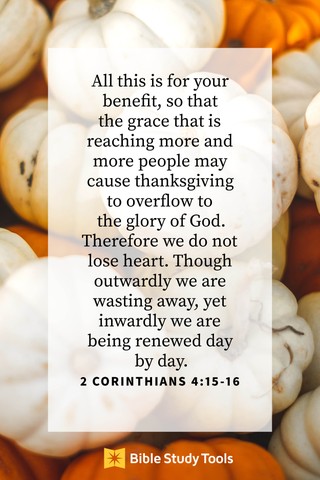
- Recent Translations
- All Translations
2 Corinthiërs 4:16
Share
Settings
2 Corinthiërs 4:16 Meaning and Commentary
For which cause we faint not
Since our afflictions are overruled for the good of others, and the glory of God, we are not discouraged by them; our spirits do not sink under the weight of them; we do not give out from the work of the ministry because of them, but go on cheerfully therein: and the more so, since
though our outward man perish;
our outward circumstances of life are very mean and despicable; we are oftentimes in a very distressed condition through hunger, thirst, nakedness, and want of the common necessaries of life; our bodies are almost worn out with fatigue, labour, and sorrow; our earthly tabernacles are tottering, and just ready to fall in pieces:
yet the inward man is renewed day by day;
that is, continually; it answers to (Mwy Mwyw) , an Hebraism; see ( Esther 2:11 ) ( 3:4 ) the internal hidden man of the heart, the new man is in a prosperous condition; our souls are in good health; the work of God is comfortably carried on in us; we have sweet and repeated experiences of the love of God; we are growing in grace, and in the knowledge of Christ; and, like the palm tree, the more weight is hung upon it, the more it thrives; and, like the children of Israel in Egypt, the more they were afflicted the more they grew.

